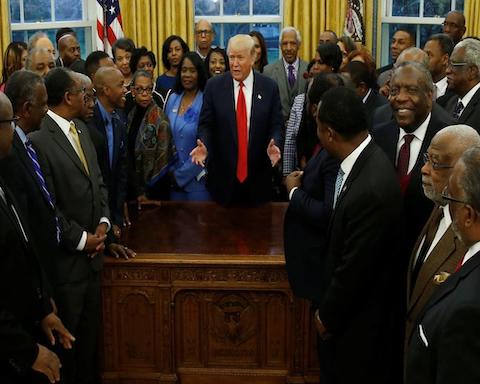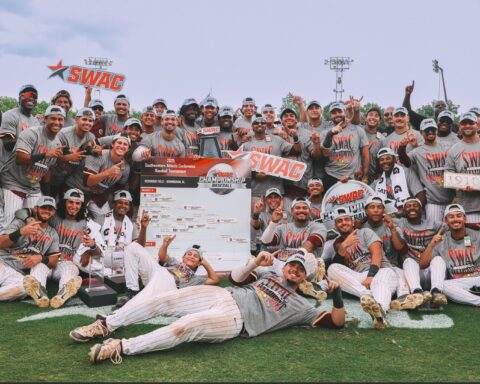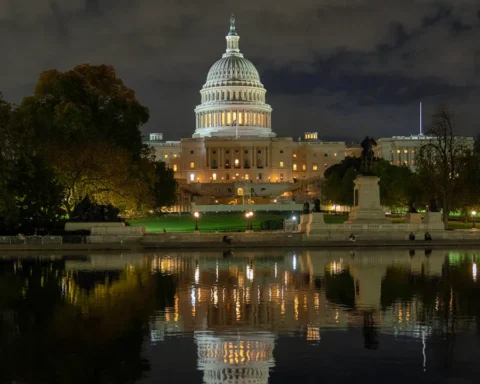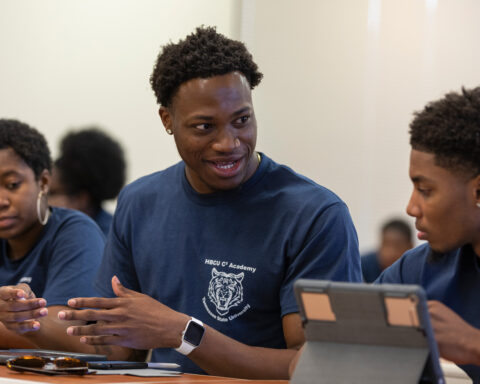President Donald Tump has made the health of HBCU’s a main feature of his education policy — and a big part of his pitch to Black voters. But for White, Thompson and others with ties to HBCUs, love for their school has not translated to support for the candidate.
“Nobody has done more for the Black community than Donald Trump,” the president said in last week’s final debate with Democratic challenger Joe Biden. He was referring, in part, to a bi-partisan bill he signed in December that restored $85 million in permanent federal funding for HBCUs.
At the same time, the Biden camp can’t count on automatic support from the HBCU community either.
Students at HBCUs are pushing back against stereotypes of Black and young voters, said Chadwick Leonard, Florida coordinator of the Fair Elections Campaign Campus Voter Project. Too often, he said, they’ve seen candidates swoop in during the last two or three weeks of a campaign, expecting their vote without offering much in return.
“The energy and the determination it takes to be an active voter on an HBCU campus is not something that should be taken lightly,” Leonard said. “It’s something that should be cultivated and courted with as much respect as with any other vote.”
Like everything else about 2020, it’s complicated.
• • •
On the first day of early voting last week, Chris Reynolds, a member of the Democratic Club of Northeast Volusia County, worked the information booth outside the Midtown Cultural Center. It’s the closest polling site to Bethune-Cookman.
Turnout is key, Reynolds said.
Trump in 2016 won Volusia, a county with more registered Democrats than Republicans. Turnout among Republicans was 80 percent, compared to 72 percent for Democrats. In one of the two heavily Democratic precincts that include Bethune-Cookman, 54 percent of voters cast ballots.
Across the nation that year, turnout among Black students was 5 percent less than in the 2012 election, and more than 10 percent less for students at HBCUs, according to a study from Tufts University.
“I think first of all, when we vote, we win,” Reynolds said. “But the problem is people are busy or dealing with multiple jobs or health care. And the less affluent aren’t able to vote as much as, say, wealthier Republicans.”
This year, Reynolds’ Democratic club has sent out more than 60,000 texts, plus fliers with slate cards, he said.
Another set of surveys from Tufts this summer found that 59 percent of Black people ages 18 to 29 felt like they were a part of a group or movement that will vote to express their views. That was slightly less than all other demographic groups.
But their support was highly concentrated. When the same group was asked to name their favored candidate, 73 percent were for Biden, compared to 9 percent for Trump.
Leonard, the Voter Project coordinator, said he’s seeing the momentum from this past summer’s demonstrations spill into election season.
“I think what it has helped with is the idea of civic engagement as a whole,” he said. “And voting is now being thought of as part of the solution, but not the complete solution.”
Students across the state are leading their own initiatives to engage voters on HBCU campuses. At Bethune-Cookman, voter registration rallies have taken place throughout the fall semester, and a week of student government voter awareness events streamed virtually, culminating last week in a march to early voting polling places.
At Florida A&M in Tallahassee, student government and Greek organizations led weekly virtual voter engagement events.
Cynthia Slater, a Bethune-Cookman alumna and president of the Daytona Beach chapter of the NAACP, said she feels young voters are living in a new era of discriminatory practices.
“I think it’s just as important today as it was in the ’60s, when there were Jim Crow laws and poll taxes,” she said. “We thought we killed Jim Crow, but instead we have James Crow Esquire III and three more generations of voter intimidation. They don’t have to be dressed up in white sheets anymore; they’re dressed in suits and ties and sit in high offices.”
Nevertheless, Slater said she’s encouraged that so many young people have become engaged.
“I think young people will be heard,” she said. “Their voices will be heard in 2020.”
• • •
In throwing his support to HBCU’s, President Trump seized on a key piece of the education puzzle for Black Americans. While the schools make up 3 percent of the nation’s four-year colleges, they enroll 21 percent of all Black undergraduate students and account for a quarter of the undergraduate degrees earned by Black people.
Lezli Baskerville, CEO of the National Association for Equal Opportunity in Higher Education, made this point in a letter she sent to Trump before he took office. She sought his support for HBCUs, which have suffered financially in recent years.
The letter led to productive meetings, the organization says.
According to his campaign, Trump created a Board of Advisors on HBCUs and signed an executive order to create an Interagency Working Group regarding HBCUs in 2017.
He signed a bill that forgave $360 million in loans to HBCUs impacted by Hurricanes Katrina and Rita, and lifted a ban on federal funding to faith-based HBCUs like Bethune-Cookman.
The Department of Education’s Capital Financing Program is also offering $500 million in loans to HBCUs, including to FAMU and Florida Memorial University. And this year, Secretary of Education Betsy DeVos announced $3.9 million in STEM-related grants to HBCUs and other institutions serving minority students.
Those steps were in addition to the December 2019 extension of funding for HBCUs signed by Trump, who in last week’s debate said this of HBCU leaders: “I got very friendly with them, and they like me and I like them. But I saved (historically black) colleges and universities.”
State Rep. James Bush III, a Bethune-Cookman alumnus and a Miami Democrat who serves on the House education committee, would not comment on Trump’s claims. But he stuck by remarks he made earlier this summer about Gov. Ron DeSantis, the staunchest of Trump allies in Florida.
“Gov. DeSantis has certainly proved that he is a friend of HBCUs,” Bush said. “That is not a fallacy, that is fact. … whether you’re a Republican or Democratic.”
Last year, the governor made an official request that the statue of a Confederate general representing Florida in the U.S. Capitol’s National Statuary Hall be replaced with a likeness of Mary McLeod Bethune, the educator and philanthropist who launched the school that today bears her name.
In July, DeSantis announced an increase of almost $20 million in funding to three private HBCUs, including an additional $13 million to Bethune-Cookman.
Still, some students have questioned why HBCUs would want to become cozy with Republican leaders.
Darnez Stovall, a Bethune-Cookman senior majoring in mass communications, said he understands the financial struggles of HBCUs. But he recalled the moment in 2017 when DeVos spoke at the school’s commencement and was booed. Earlier that year, DeVos sparked outrage when she said HBCUs had been “real pioneers” of school choice. In fact, they were founded out of necessity, in response to segregation.
Edison Jackson, Bethune-Cookman’s president at the time, defended DeVos’ appearance, saying, “We have always been in the business of making friends, and if you don’t have friends, it’s very difficult to raise money.”
“So do we just do deals with the devil now?” Stovall asked. “They do help, but they bring so much more shame than good.”
Jabari Knox, a senior majoring in political science at Florida A&M and the chief of staff for its student government, called DeSantis a Trump “pawn,” and contends neither man is a true supporter of HBCUs.
“You can’t not say Black Lives Matter and then say you’re a friend of HBCUs, or endorse the Proud Boys and say you saved them,” he said.
Robyn Seniors, another FAMU senior, is co-chair of HBCUs for Biden, a wing of the campaign designed to engage voters on HBCU campuses across the country. She said watching the first presidential debate was difficult for her.
“The current president was unable to denounce white supremacy,” she said. “That means a lot to young, Black voters. We have someone to vote for but also someone to vote against.”
Seniors also said she’s grateful Biden picked a running mate “who looked like” her. Sen. Kamala Harris, an HBCU graduate, provides extra incentive to vote for the ticket, she said.
Plus the Biden campaign, she added, promises to devote $70 billion to HBCUs, including $10 billion to start research incubators at the schools and $18 billion in grants to four-year HBCUs and other institutions that serve minorities.
“Kamala galvanized HBCU votes,” Seniors said. “She’s smart and fierce and genuinely cares about getting work done.”
• • •
Not everyone on HBCU campuses feels that way about the ticket.
Thompson, the Bethune-Cookman freshman, said she voted for Biden, but felt like she was voting for the lesser of two evils. Harris being an HBCU alumna didn’t mean much to her either, she said, citing the senator’s record as a prosecutor and attorney general in California.
“I don’t like her,” Thompson said. “She hasn’t done anything for the Black community. You can go to an HBCU, but I can’t respect someone who does nothing for their community.”
Her feelings for Biden weren’t any warmer, she said. “He lost me when he said if you don’t vote for him, you’re not Black.”
White said said she felt the same, though she also voted for Biden.
“This presidential election is a joke, to be honest,” she said. “I’m really worried about these next four years, whoever wins. Biden says he’ll do stuff for HBCUs and the Black community, but I just don’t have faith.”
Thompson said she believes students today are more informed than previous generations because of social media.
“We can look up our own information and form our own opinions,” she said.
They are more energized, too, White said.
“Actions speak louder than words. Our generation takes action. Since we started doing riots, things have started to change. For us, enough is enough.”
Courtesy of Times Political Editor Steve Contorno





